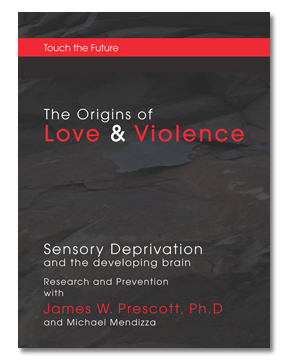Watch the video tribute below.
From Darcia Narvaez, PhD
 Dr. James Prescott is one of my founding mentors for the work I do today. His papers were an alert, a wake up call, an inspiration that lit up my intuitions about the world having gone wrong. I discovered his origins of violence video and his published paper examining the characteristics of peaceful societies. Breastfeeding for at least 2.5 years! Holding babies and young children in arms most of the time. These led me to find other anthropological and neuroscience scholarship as well as evolutionary systems.
Dr. James Prescott is one of my founding mentors for the work I do today. His papers were an alert, a wake up call, an inspiration that lit up my intuitions about the world having gone wrong. I discovered his origins of violence video and his published paper examining the characteristics of peaceful societies. Breastfeeding for at least 2.5 years! Holding babies and young children in arms most of the time. These led me to find other anthropological and neuroscience scholarship as well as evolutionary systems.
Dr. Prescott was kind enough to come to the first conference I hosted at the University of Notre Dame on evolution, early experience and human development. Allan Schore and Jaak Panksepp helped me organize the invitation list. The list included Sue Carter, Vincent Felitti, Tiffany Field, Alison Fleming, Peter Gray, Barry Hewlett, James McKenna, Michael Meaney, Eric Nelson, Stephen Porges, Colwyn Trevarthen, Wenda Trevathan among others.
Because of Dr. Prescott’s immense importance in inspiring the conference, I asked him to give the opening presentation. You can find it online at YouTube on Evolved Nest’s channel.

The notion of the evolved nest is a transdisciplinary insight from across sciences: anthropology, neuroscience, evolutionary systems, developmental and clinical sciences. The evolved nest represents love in action.
The work I do now on our species’ evolved nest supports Dr. Prescott’s insights, that pain and stress misdirect development, and that loving care and affection nurture a human nature of cooperation and compassion.
Meeting children’s needs is especially important in babyhood, when the brain is rapidly developing its thresholds, parameters and functioning for multiple systems. There are nine components we have studied in my lab, components found in traditional societies the world over.
Although two of the components are only for young children, we all need to experience the rest of the evolved nest components throughout life. First, babies need soothing perinatal experiences and extensive child-directed breastfeeding, We all need a welcoming social climate from the beginning to the end of life. We need multiple bonded, trusted nurturers or mentors in each phase of life. We need affectionate touch and no negative touch as part of responsive calming care. We are enhanced by self-directed play, nature immersion and connection, and restorative healing practices. There is evidence now for the importance of all these features for seeding and maintaining health across the lifespan.
Dr. Prescott has advocated against infant circumcision. It is an extremely traumatizing experience that no child should experience. It can have long term negative effects physiologically, psychologically and socially. There are other loving ways to welcome children to a community.
I write about how industrialized civilization in particular has forced everyone onto a trauma-inducing pathway instead of taking our species normal wellness-promoting pathway. The trauma inducing pathway does not meet basic needs of children or community members, fostering ill health and poor sociality, leading to a lack of social and emotional intelligence and a lifeway that is destructive of life. Our species normal wellness promoting pathway meets basic needs of every age—those who need more, receive more. This fosters healthy physiology, psychology, sociality. This leads to heartminded individuals and communities who then live regeneratively with all of life. We can return to the wellness pathway when we remember and practice the lessons that Dr. Prescott first gave us: treat the young with loving affection.
Thank you, Dr. Prescott, for all your research, for your courage in speaking about it and for continuing to advocate for the wellbeing of children and all of us.
Watch the Video Tribute
Resources
Read James Prescott on Kindred.
Rock-a-bye Baby Documentary: The Harlow Monkey Experiment
Absence Of Pleasure More Traumatizing Than Physical Pain
Breastfeeding and Bonding Prevent Infant Mortality and Adult Suicide
Sensory Deprivation and the Developing Brain
How Culture Shapes The Developing Brain And The Future Of Humanity
Watch Prescott’s presentation at Notre Dame’s Human Nature and Early Experiences Symposium

